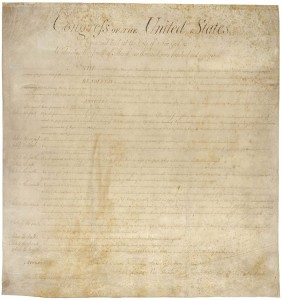Bill of Rights Day
Friday, December 14th, 2018December 14, 2018
Tomorrow, December 15, is Bill of Rights Day in the United States. The observation commemorates the day the Bill of Rights came into effect on Dec. 15, 1791. The Bill of Rights is a document that describes the fundamental liberties of the people and includes the first 10 amendments to the U.S. Constitution. The purpose of Bill of Rights Day is to make Americans increasingly aware of their rights and responsibilities as citizens. President Franklin D. Roosevelt first proclaimed December 15 as Bill of Rights Day in 1941.

Click to view larger image
Bill of Rights Day marks the Dec. 15, 1791, approval of the first 10 amendments to the Constitution of the United States. The original draft of the Bill of Rights is seen here. Credit: National Archives
The Bill of Rights lays out fundamental rights and also forbids the government to violate these rights. The constitutions of many democratic countries have bills of rights that guarantee everyone the freedoms of speech, of religion, and of the press, and the right of assembly (elements of the First Amendment to the U.S. Constitution).

The Bill of Rights and other important documents are on display at Exhibition Hall in the National Archives Building in Washington, D.C. Credit: © Dennis MacDonald, Alamy Images
Individuals are considered to be born with certain inalienable rights—that is, rights that governments may not take away from them. These rights are considered to be part of a “higher law,” a body of universal principles of right and justice that is superior to laws created by governments. Some of these rights, such as the freedoms of speech and of the press, support democracy. Others, such as the right to trial by jury (Seventh Amendment), are essential to justice.
The U.S Constitution, adopted in 1788, contained few personal guarantees. Statesman and future president James Madison pushed for the adoption of the 10 amendments that became known as the Bill of Rights. The first eight amendments contain the fundamental rights and freedoms of every citizen. The Ninth Amendment forbids the government to limit freedoms and rights that are not listed in the Constitution. The Tenth Amendment limits the powers of the federal government to those that are granted to it in the Constitution.


